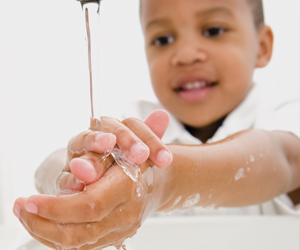Ciska Thurman explores the road from potty to puberty, and how to teach and ensure your kids’ personal hygiene along the way
Dr Nicola Thompson names four easy habits even younger children should be practising on autopilot. These should not feel like duties or chores, but should become part of everyday routines.
• Good toilet habits (for example, hand-washing every time)
• Washing hands before and after meals
• Brushing teeth twice a day
• Bathing regularly
Encouraging independence as children become school-ready is crucial. Dr Thompson clarifies the problem: ‘From a toileting perspective, it’s usually between the ages of four and four-and-a-half that children successfully learn to wipe their bottoms (urinary independence occurs much sooner than that). This tends to coincide with them growing tall enough to reach the basin and see what it is they are doing.’ Emulational teaching can help achieve this: allowing your child to emulate you or an older sibling as they’re learning how to do an adequate job themselves.
‘Allowing them to do the task themselves and offering help if it isn’t going well – praise them and their efforts, don’t attribute blame – works best.
‘For example: “Goodness, it looks as though the dirt on your hands is being really stubborn. You’re doing a great job. Would you like me to see if I can help you get it off?”’
The dirt chronicles
Talk to your children about keeping clean from the start. ‘The concept emerges from a dialogue when they start eating and touching solid food,’ says Dr Nicola Thompson, a family practitioner with special interest in women’s and children’s health.
‘Encourage hand-washing before meals, and make sure they clean their hands and faces after meals.’ Dental hygiene should start even before the first tooth shows up: massaging and cleaning gums, and encourage your baby to play with an age-appropriate toothbrush, so they’ll get used to it.
‘If you start from birth, it becomes habitual,’ says Dr Thompson. As your little ones watch and listen to you talk about keeping yourself clean, a natural progression develops – their increasing independence combined with curiosity leads to them wanting to do smaller tasks for themselves. ‘At around three years of age, this coincides with them learning about it formally at nursery school’. At this stage the endless ‘but why?’ questions will start. ‘So satisfy their curiosity by describing “the small bugs that can make their tummy a bit sore”, rather than scaring them with details about bacteria and infection.’
The challenge of change
Right when it seems that your child is independently maintaining their personal hygiene, all the big changes that come with puberty hit. ‘For girls, puberty can start at any time between eight and 14 (average age 11), and boys will start to experience it from nine to 14 (average age 12),’ explains Dr Thompson.
‘Approach puberty with sensitivity. It’s a very hard time for an adolescent, mainly because they are going through intense emotional changes, and they haven’t yet developed the ability to articulate and deal with the changes as an adult would.’
Changes in body odour; the growth of hair in new places; the enlargement of the breasts and male sex organs; the onset of menstruation – all these transformations need to be met early with information and support. Start talking at home about what puberty means before playground banter or an embarrassing experience marks or misleads them (and yes, by now sex should be a non-taboo topic).
Dr Thompson then proposes some practical and gender-specific ways of tackling big issues like menstruation and masturbation with your pre-teen. Remember that cultivating open and genuine communication, without any embarrassment or beating-around- the-bush tactics, will demonstrate the importance of privacy and dignity to your teen at this time.
Take your daughter… shopping for sanitary-ware before she needs it. Make the outing both informative and fun (try a girls’ lunch, maybe?). That way, she’s prepared for her period when it finally arrives.
Talk to your son… about wet dreams and the importance of linen-changing. Also emphasise to both your son and daughter that masturbation is totally normal and healthy, and not at all shameful.
The final word
Good hygiene isn’t just about keeping your child looking presentable, but an active means of preventing the spread of illness. It’s simple: a clean child is a healthy child. So strike the balance between messy play and good clean fun, paving the way to them becoming an informed and empowered, healthy young adult.








